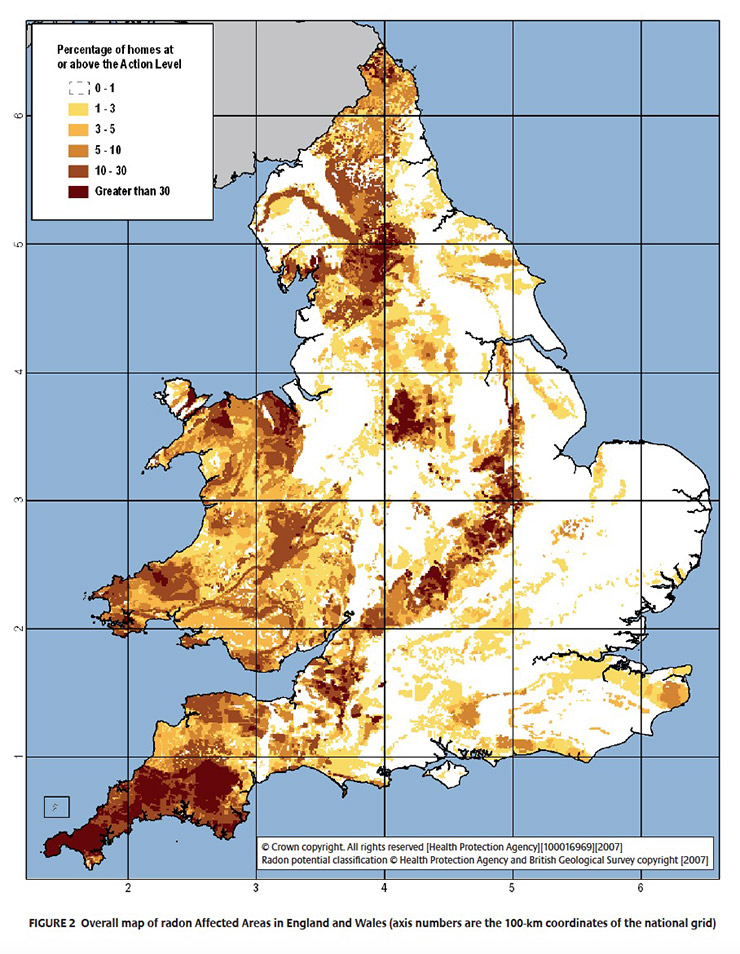Home › Forums › Chat Forum › Radon gas risks, TB?
- This topic has 14 replies, 11 voices, and was last updated 6 years ago by twinw4ll.
-
Radon gas risks, TB?
-
twinw4llFree MemberPosted 6 years ago
Just in the process of buying a property and searches have come back with high risk of Radon gas am i about to be sucker punched?
Is this just another rising damp type scam?
thecaptainFree MemberPosted 6 years agov small cancer risk innit? Are you old, have you got young children likely to be spending time in the worse areas (basement usually)? I personally wouldn’t be bothered but resale might be an issue.
mikewsmithFree MemberPosted 6 years agoDue to radon gas some parts of Cornwall reported more radiological exposure than I was getting in the nuclear industry, similar to long haul pilots.
Detectors get fitted and proper vents under the house was common.
You can find a map on Google of the areas that are worst off.
Very little to really worry about though
grizedaleforestFull MemberPosted 6 years agoIf you’re concerned you can require a Radon Bond from the seller – basically an insurance policy to cover the cost of remediation if required. I’m sure your solicitor will know abou ti.
I live in a house which turns out to have really high radon levels. I’ve been in the process of installing a sump and pump for a year now 🙂
Ming the MercilessFree MemberPosted 6 years agoIt wouldn’t put me off buying a place. Just keep the place draughty until you’ve had the remedial work done.
munrobikerFree MemberPosted 6 years agoThe remedial work doesn’t cost much – I’d have a look at the UK Radon website. You’ll need to know what sort of floor slab the building has but the seller should cover it, as above.
coreFull MemberPosted 6 years agoKinda difficult to mitigate against in old properties as you can never really get a complete seal on the floor-wall junction and employ tray details like with cavity wall construction, or build in membranes from the outset. But, floors can be dug up, membranes installed (which might coincidentally help with damp/cold floors as insulation can be incorporated too if there’s none already) and sumps/pumps put in.
It really depends on the age of the property if it’s an issue, anything from the last 15 years or more should have been designed with appropriate radon protection. And generally if the house has a suspended ground floor (timber or beam and block) with a ventilated sub-floor void it’s a non issue.
Monitoring devices can be installed, and frequently are to assess radon levels, this is the correct course of action, with any mitigating measures being implemented only after radon levels have been established.
As with lots of house problems, VENTILATION is key.
Richie_BFull MemberPosted 6 years agoWouldn’t be put off but I would be looking at whether is had a solid or suspended ground floor or whether the floor to ceiling height in the ground floor is too low to raise the floor slightly. Those are the things that will affect the costs of installing sumps.
Used to live in a town where radon was common but you tended to get rows of houses where only one house was badly affected because of the underlying geology. Unless a test has already been done on that house risk is usually assessed by post code rather than by looking at the building or a geological map. Our current house is classed as being at risk but the geology beneath us us completely wrong for radon.
Specifically ask the question whether the house has already been tested
dirksdigglerFree MemberPosted 6 years agoAround here minimum timeframe for reliable radon air sampling is 30days I believe.
andy4dFull MemberPosted 6 years agoI live in a high radon area and bought a new (at the time) build about 15 years ago. As part of the build a radon barrier was put in all the houses foundations by the builder. Don’t know if it works or is snake oil. Radon would not put me off buying.
wrightysonFree MemberPosted 6 years agoThe “barrier” is as core suggested above, taped and sealed across the cavity and down and under the floor slab, load of piss if you ask me but the nhbc like to pick on things like that rather than checking whether there’s any **** cement in the concrete etc etc.
wrightysonFree MemberPosted 6 years agoNice little quote
“<b>Radon</b> gas is a known cause of lung cancer. Many areas with karst bedrock are composed of <b>limestone</b>. Phosphate minerals that occur naturally in <b>limestone</b> contain small amounts of uranium. Uranium is a radioactive, toxic element which is easily oxidized.”
munrobikerFree MemberPosted 6 years agoDon’t know if it works or is snake oil.
It does work. The barriers come in all sorts of styles, and a lot of new houses these days will have barriers to prevent buildups of CO2/Methane etc. Often the floor slab (if it’s cast in-situ) is enough to stop gas getting into the building, but if it doesn’t then the membrane will. It’s a genuine problem on a lot of brownfield sites. The radon barriers are lighter than the CO2/Methane barriers but still do the job of preventing gas getting into the building and dissipating to the open air where it can’t concentrate.
The topic ‘Radon gas risks, TB?’ is closed to new replies.

